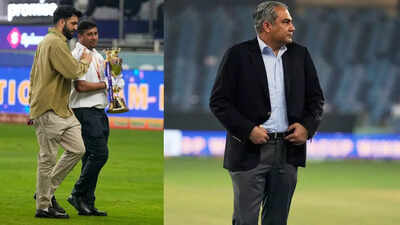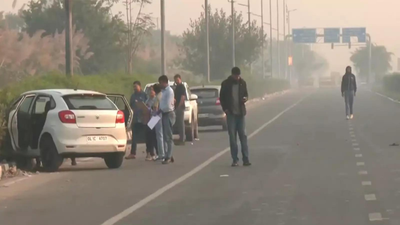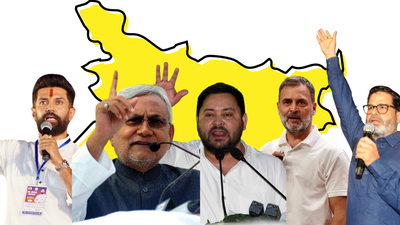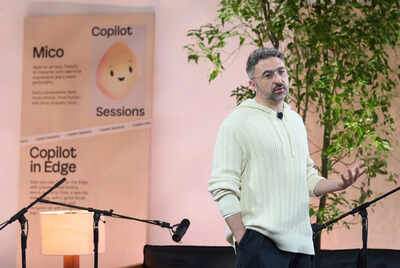Exclusive | The Estonian who played two chess tournaments in two formats on same day — and came out a champion | Chess News
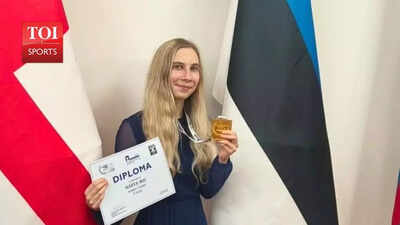
NEW DELHI: The size of Estonia, a country on the borders of the Baltic Sea and the Gulf of Finland, is roughly equivalent to that of India’s capital, New Delhi. However, despite having nearly 30 times fewer people than Delhi, Estonia has carved a proud space for itself in the world of chess, and one of the biggest reasons behind that is 26-year-old International Master (IM) and Woman Grandmaster (WGM) Mai Narva.“Chess isn’t very big in Estonia,” Narva told TimesofIndia.com. “It doesn’t get so much attention, especially compared to countries like India or China. But when someone does well, like me or others, it makes it to the news, and that’s nice.” Almost a day-and-a-half drive south from Estonia is Batumi, a scenic city on Georgia’s Black Sea coast, which has hosted some of the most prestigious chess events this year, from the Women’s World Cup earlier in the season to the European Team Chess Championship most recently.It was there, amid the classical boards and long-time controls, that Narva found herself juggling a second, entirely different challenge, an online knockout tournament halfway across the world.At a time she played over-the-board in Batumi, the Global Chess League (GCL) had scheduled its Contenders Knockout. Narva decided to take on both. And how did it end? Navra clinched the title in the Women’s section.“All the matches were stressful. But of course, when I won, I was extremely happy,” she added.The win made her the Women’s Contenders champion, earning her the title of GCL 2025 Ambassador, which means she could be called up as a replacement for any GCL team in the main league if a player withdraws.“I guess I was just shocked,” she said with a smile. “It was so intense, the match, that after I won, I had to calm down from the adrenaline.”When the GCL invitation arrived, Narva already had plans in Georgia, deep into the European Team Chess Championship.“I got this email asking if I’d like to participate in the third round. It was completely unexpected,” she said. “The difficult bit was that I knew I’d be playing a tournament in Batumi, but I decided I’d make it work. So I managed to play both.”That “making it work” meant hours of mental switching, moving from long classical games during the day to high-speed knockouts online in the evening.“It was very nice that the organisers accommodated us,” she explained. “Both me and Yuliia Osmak played a classical game first, and then in the evening we played the GCL match.”And the biggest respite for the Estonian was that it was not another over-the-board affair. “For this kind of time control, it’s very good to play online because you can pre-move with the mouse and play faster,” she said. “Over the board, it can get a bit too chaotic.”

Mai Narva
Back home, Narva, who hails from a family of respected chess players, with sibling, parents, and grandparents all chess players, is gradually becoming the face of the growing chess culture. “I’m not that famous in Estonia,” the 26-year-old, currently holding a standard rating of 2403, laughed. “Sometimes people ask for a selfie, but Estonians are quite introverted, so it’s always polite.”Narva’s chess journey began at five, clutching the hands of the elders in her family.“I started young and did well in youth tournaments,” she said. “Then I went to college and didn’t play much for a while. After that, I decided to focus fully on chess, and right now, it’s working out.”Soon she became a four-time Estonian women’s champion and a standout name in European chess, winning youth and team titles, including a silver at the 2024 Estonian Men’s Championship (Open category) and bronze at the 2025 European Women’s Championship.Her recent campaign at the FIDE Women’s Grand Swiss in Samarkand reaffirmed her authority on the game of 64 squares as Narva finished 11th there, a strong performance above her initial ranking. Though improving her rating was perhaps the least of her takeaways: “Samarkand was very nice. Everything is well organised. There are even snacks during the rounds, maybe not important for everyone, but for me, it’s a very nice touch.”
